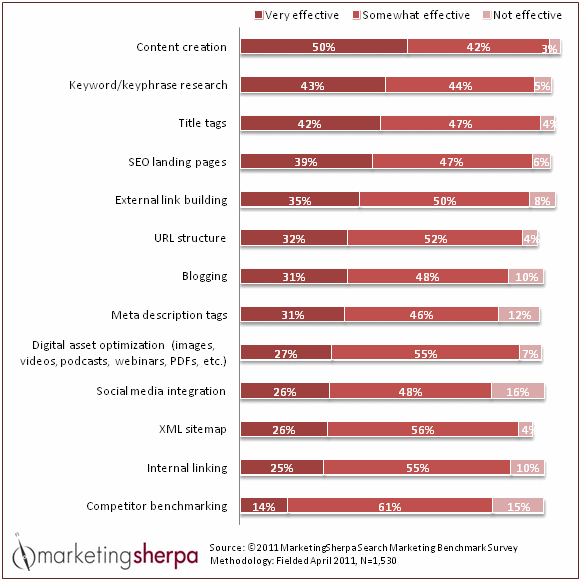BECOME W.I.S.E.R. with Your AI Prompts - A guide for sales managers
Everyone’s wittering on about AI like it’s the second coming. But here’s the rub: if you give it half-baked prompts, you’ll get half-baked answers....
3 min read
James Chatman Updated on June 12, 2014

 New data from a Marketing Sherpa survey of more than 1,500 search marketers has revealed that more than 50% of CMOs see content creation as a very effective tactic to improve SEO rankings. Keyword research followed closely behind, with 43% finding this strategy very effective. External link building has slid to 5th place, with 35% rating it as very effective.
New data from a Marketing Sherpa survey of more than 1,500 search marketers has revealed that more than 50% of CMOs see content creation as a very effective tactic to improve SEO rankings. Keyword research followed closely behind, with 43% finding this strategy very effective. External link building has slid to 5th place, with 35% rating it as very effective.
This data comes in the wake of Google’s ‘Penguin’ algorithm update, the latest in a series of updates designed to combat web spam and reward websites with high quality content. Consequently, we predict that ‘old school’ SEO tactics will fall further out of favour and that content, link quality and social signals will be the most significant indicators of authority.
But what are the implications for B2B marketing? What can B2B marketers do to ensure they remain in Google’s good books (and search results)?
The first step is to audit your existing website content to make sure it adheres to Google’s quality guidelines. Google’s site quality algorithms are aimed at helping people find high quality sites by reducing the rankings of low-quality content. In a post on the official Webmaster Central Blog, Google posed a list of questions that webmasters could use to assess the quality of a page or article. We recommend you read over this thoroughly.
When auditing your website content, you need to ensure that the content is written for readers – not search engines. It’s important to make your website is user-centred, so remove any instances of keyword stuffing. Try re-writing the content without worrying about keywords. Then, once you have written the copy, look at ways you can subtly insert keywords - where it makes sense - without hurting the flow of the writing.
A blog is like the Swiss Army Knife of online marketing. Not only is it an immensely powerful SEO weapon, it also fuels social media engagement, drives website traffic and allows businesses to establish themselves as thought leaders in their industries. Every B2B marketing strategy should incorporate blogging. But how should you go about developing a blogging plan?
When developing a blogging plan, B2B marketers should consider:
We recommend a user-centred and topic-driven approach to blogging. Many organisations use a keyword-driven approach that involves selecting a keyword and then writing a post about it. We do not recommend this approach. Rather, we recommend that you select your topics based on the needs and interests of your readers, which should also increase traffic from long tail phrases.
In years gone by, link building involved building masses of links with little regard for quality. However, this has changed since Google brought in the Panda update, which decimated content farms and many article directory sites by reducing the value of outbound links. Google is now placing more value on the relevancy and quality of links.
We recommend B2B marketers leverage guest blogging to build links. When done properly, guest blogging involves writing quality posts on relevant industry blogs which link back to your website. The more relevant and authoritative the site the guest blog is published on, the more link juice it will deliver to your website. Some other ways to build quality links include affiliations with other businesses and sponsoring charity or government events.
Social signals are playing an increasingly important role in search engine rankings. This is exemplified by the integration of Google+ into Google’s search results. When determining the authority of websites and web pages, search engines take into account various social signals including:
We recommend that B2B marketers focus on tactics that will increase social reach. The more social connections a business has, the more likely it will be to benefit from social signals. Furthermore, we recommend that social media be used not only as a space to build relationships, but also as a primary content distribution channel. This will not only drive more referral traffic, it will also drive social signals such as shares, +1s and re-tweets.
If you'd like to learn more about the value of social media in B2B marketing, get your hands on our free article about social media's link to revenue:
Do you agree that there's a heavier focus on content in the industry than ever before? What does this mean for small businesses that still want that backlinking boost from SEO companies?
Subscribe to our latest news and updates on HubSpot.

Everyone’s wittering on about AI like it’s the second coming. But here’s the rub: if you give it half-baked prompts, you’ll get half-baked answers....

The business world is falling head over heels for AI—and who can blame it? With promises to reduce grunt work, uncover insights, and turbocharge...

Search is evolving - fast. For two decades, SEO has revolved around Google’s algorithm: keywords, backlinks, metadata, and page speed. But with the...